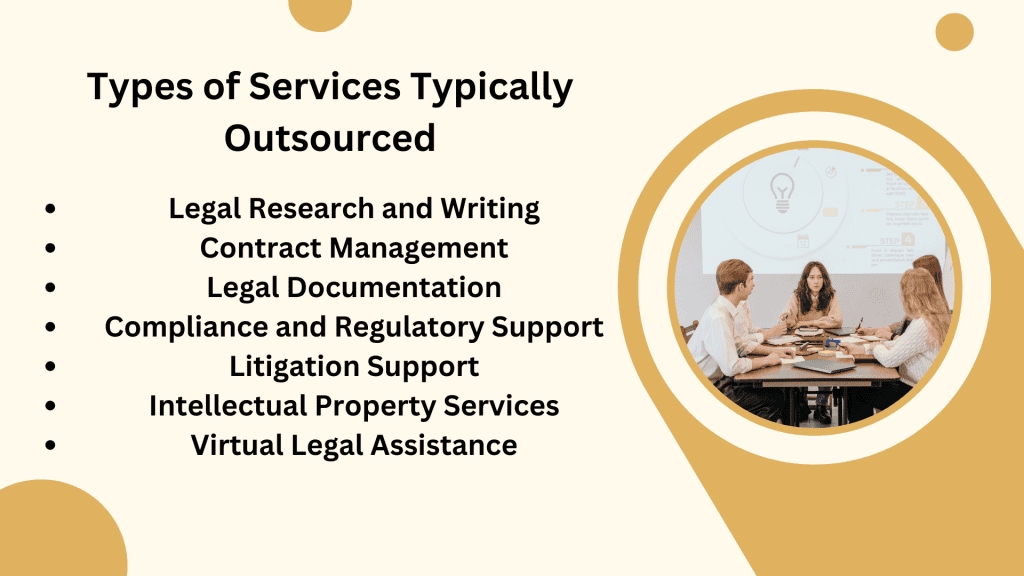Outsourcing legal services has become a pivotal strategy for many law firms and businesses seeking to streamline legal processes and reduce costs. This approach involves delegating legal tasks, such as legal research, legal documentation, and contract management, to external specialists. By leveraging legal support from outside sources, entities can focus on their core competencies while ensuring legal compliance and obtaining professional legal assistance.
One of the key benefits of outsourcing legal services is access to specialized legal expertise without the overhead costs of full-time staff. Law firms and businesses can utilize outsourced legal administration, virtual legal assistance, and other legal solutions to manage their legal needs more efficiently. Legal technology also plays a significant role in this, enabling smoother collaboration and management of outsourced tasks.
However, it’s crucial to understand the risks involved. Selecting the right legal outsourcing companies requires careful consideration of their expertise, track record, and ability to provide cost-effective legal outsourcing. When managed legal services are sourced from offshore legal services or involve international legal outsourcing, it’s essential to be aware of the legal and cultural differences that may impact service delivery.
In the realm of legal process outsourcing (LPO services), various aspects like legal documentation, contract management outsourcing, and legal research services are commonly outsourced. These services, when chosen from top legal outsourcing companies, ensure that high standards are maintained.
For small businesses or startups, legal outsourcing can be particularly beneficial. Affordable legal outsourcing solutions like legal staff augmentation or on-demand legal services provide flexibility and scalability. Legal outsourcing for tech companies and financial services has also seen a rise, reflecting the diverse application of these services.
What is Legal Outsourcing?
Legal outsourcing, also known as Legal Process Outsourcing (LPO), is the practice where law firms and corporate legal departments transfer legal tasks to external vendors. These vendors are often located offshore and specialize in providing a variety of legal support services. Outsourcing legal services has become a strategic approach for many law firms and businesses seeking cost-effective legal solutions, allowing them to focus on core activities while external experts handle specific legal tasks.
Historical Context and Evolution
The evolution of legal outsourcing dates back to the early 2000s, with the rise of globalization and technological advancements in legal technology. Initially, legal outsourcing was primarily focused on basic legal tasks such as transcription. However, it has now expanded to include complex activities like legal research, contract management, and compliance services. The growth of this sector has been driven by the increasing pressure on law firms and legal departments to reduce costs and improve efficiency.

Types of Services Typically Outsourced
- Legal Research and Writing: This involves conducting thorough research on legal precedents and drafting legal documents, memos, and briefs.
- Contract Management: This includes drafting, reviewing, and managing legal contracts to ensure compliance and mitigate risks.
- Legal Documentation: Preparation and management of various legal documents, such as court documents, legal agreements, and due diligence reports.
- Compliance and Regulatory Support: Ensuring that businesses comply with relevant laws and regulations to avoid legal repercussions.
- Litigation Support: Assistance in various aspects of litigation, including discovery, case management, and document review.
- Intellectual Property Services: Managing IP rights, including patent research, trademark registration, and copyright protection.
- Virtual Legal Assistance: Providing remote support for various legal tasks, enhancing flexibility and reducing the need for in-house legal staff.
Benefits of Outsourcing Legal Services
Outsourcing legal services can be a highly cost-effective strategy for businesses. By engaging external legal experts, firms can significantly reduce their operational costs. Outsourcing eliminates the need for in-house legal staff, which means savings on salaries, training, and benefits. Additionally, legal outsourcing companies often have streamlined processes for common legal tasks like legal research and legal documentation, further cutting down expenses.
For instance, in legal document processing and contract management, outsourcing can reduce costs by up to 30%. This efficiency stems from specialized legal outsourcing firms having dedicated teams and technology for these tasks, making the process quicker and more cost-effective than in-house handling.
Access to Expertise
Outsourcing legal services provides access to a wide range of legal expertise. Law firms specializing in outsourcing have teams with diverse legal backgrounds, ensuring that businesses can find the exact skill set they need, from legal research to contract management. This expertise is particularly beneficial for niche areas of law or for handling international legal outsourcing needs.
For example, a firm specializing in legal support services may offer deep knowledge in emerging areas like legal technology and legal compliance, which can be invaluable for companies navigating these complex fields.
Increased Flexibility
Outsourcing legal services offers increased flexibility in staffing and resource management. Legal process outsourcing (LPO) services allow firms to scale their legal support up or down as needed, without the long-term commitment of hiring full-time staff. This is especially useful for project-based work or for handling fluctuating workloads.
Utilizing outsourced legal administration and virtual legal assistance can help businesses adjust quickly to changing demands, providing on-demand legal services that align with current needs.
Focus on Core Business
By outsourcing legal tasks, businesses can focus more on their core competencies. Delegating legal processes to external firms allows companies to concentrate on their primary business activities without being sidetracked by legal complexities.
Risks Involved in Outsourcing Legal Services
Outsourcing legal services is an increasingly common practice for law firms and corporations seeking to streamline their legal processes. While it offers various benefits, it also presents several risks that need careful consideration.
Quality Concerns
One of the primary risks associated with outsourcing legal services involves quality concerns. Law firms and businesses often worry about the quality of outsourced legal tasks, such as legal research, legal documentation, and contract management. Ensuring that the external vendors have the requisite legal expertise and adhere to high-quality standards is crucial. Legal outsourcing companies must demonstrate their ability to handle complex legal processes and deliver results that meet the client’s expectations.
Confidentiality and Security
Confidentiality and security are paramount in the legal field. When outsourcing legal services, there’s a risk of data breaches and information leaks. This is especially concerning for legal support and legal assistance that involve sensitive client information. Employing robust legal technology and ensuring that the outsourced legal administration adheres to stringent data privacy laws are essential to mitigate these risks.
Compliance and Liability Issues
Outsourcing legal tasks can lead to challenges in legal compliance and potential liabilities. Law firms and businesses must ensure that their legal process outsourcing (LPO) partners are compliant with the relevant legal regulations. This includes understanding the nuances of international legal outsourcing and managed legal services, and ensuring that legal outsourcing solutions adhere to the legal standards of the client’s jurisdiction.
Dependence on External Vendors
Another risk is the over-reliance on external vendors for essential legal services. This dependence can become problematic if the outsourcing company fails to deliver or goes out of business. Legal department outsourcing should be approached with a strategy that includes backup plans and a clear understanding of the capabilities of the provider in offering specialized legal services.
Managing Risks in Legal Outsourcing
Managing risks in legal outsourcing is crucial for law firms and businesses seeking to leverage external expertise for legal tasks. To ensure a successful partnership with an outsourcing legal services provider, several best practices should be followed.
Best Practices for Vendor Selection
When choosing a provider for outsourcing legal services, consider the following criteria:
- Expertise in Legal Services: Ensure the provider has a proven track record in legal tasks, such as legal research, legal documentation, and contract management.
- Reputation in the Market: Look for providers recognized for their legal support and legal assistance capabilities.
- Technological Capabilities: Providers should have up-to-date legal technology to handle legal processes efficiently.
- Compliance and Legal Expertise: The vendor should be well-versed in legal compliance issues relevant to your specific needs.
Establishing Strong Agreements
Clear contracts and service level agreements (SLAs) are essential in legal process outsourcing (LPO). These should cover:
- Scope of Legal Tasks: Specify the range of services, from legal research services to legal document processing.
- Quality Standards: Set clear expectations for the quality of work, aligning with legal outsourcing trends.
- Confidentiality and Security: Ensure the agreement covers aspects of data security and privacy, crucial for legal administration.
Regular Monitoring and Communication
Ongoing oversight is key to managing outsourced legal administration effectively. Implement these strategies:
- Regular Reporting: Set up a system for regular updates on legal tasks, ensuring alignment with your legal solutions.
- Performance Metrics: Use specific metrics to assess the quality of legal outsourcing benefits, like turnaround time and accuracy.
- Feedback Loops: Establish clear channels for feedback to facilitate continuous improvement in legal support services.
Conclusion
Outsourcing legal services offers a spectrum of benefits and risks. This approach allows law firms and businesses to delegate legal tasks, such as legal research, documentation, and contract management, to specialized providers. Utilizing legal outsourcing companies can lead to significant cost savings, especially in areas like legal document processing and legal support services. It’s a strategic solution for managing legal tasks efficiently, while also accessing specialized legal expertise.
However, it’s crucial to consider the risks. Outsourcing legal services might lead to concerns over legal compliance, data security, and quality of work. Ensuring that the chosen provider adheres to high standards of legal administration and expertise is vital. This is particularly relevant in scenarios like offshore legal services or when engaging in international legal outsourcing.
One key aspect of outsourcing is leveraging legal technology. Legal process outsourcing (LPO) services often use advanced technology for tasks like legal document review, enhancing efficiency and accuracy. For small businesses, outsourcing legal tasks can be a game-changer, offering access to high-quality legal services without the overhead costs associated with in-house legal departments.
Legal outsourcing trends show a growing preference for specialized legal services. This includes areas like virtual legal assistance, which can offer on-demand legal services tailored to specific needs. It’s a cost-effective way to manage legal tasks and stay compliant with evolving legal standards.
When considering outsourcing legal services, it’s essential to conduct thorough research. This includes evaluating the best legal process outsourcing firms and understanding the benefits and challenges involved. Ethical legal process outsourcing should be a priority, ensuring that the legal outsourcing company maintains the highest standards of confidentiality and professionalism.
FAQs
What is legal process outsourcing?
Legal process outsourcing (LPO) involves delegating law-related tasks to an external firm or service provider. Typically, these tasks are sent to providers outside the company’s country, often where operational costs are lower. LPO can include a variety of services, ranging from document review and legal research to drafting legal agreements and patent services.
How does outsourcing legal services benefit companies?
Outsourcing legal services benefits companies by reducing costs, providing access to specialized expertise, and improving efficiency. It allows firms to handle large-scale legal work without expanding their in-house team. This approach also enables companies to manage variable workloads effectively and focus on core business activities.
What services are typically included in legal outsourcing?
Services typically included in legal outsourcing encompass document review, legal research, contract management, compliance assistance, litigation support, patent services, and drafting legal documents. These services cover a broad spectrum of legal needs that can be efficiently managed by external specialists.
Are there risks associated with outsourcing legal services?
There are risks associated with outsourcing legal services, including confidentiality breaches, quality concerns, and issues with compliance and differing legal systems. Companies must carefully select reputable service providers and establish clear contracts and protocols to mitigate these risks.
How can legal outsourcing reduce costs?
Legal outsourcing can reduce costs by leveraging lower labour costs in different geographical regions, reducing the need for in-house legal staff, and enabling more efficient handling of routine or specialized tasks. This model allows for scalability and flexibility in managing legal expenses.
What industries commonly use legal outsourcing services?
Industries commonly using legal outsourcing services include banking and finance, healthcare, technology, real estate, and manufacturing. These industries often face a high volume of legal work and benefit from the specialized services and cost efficiencies provided by LPO.
How does legal outsourcing impact law firms?
Legal outsourcing impacts law firms by providing them with opportunities to reduce operational costs and focus on high-value tasks. It can also introduce competitive pressures, as firms must adapt to a market where clients have more options for legal services. However, it can also be a strategic tool for law firms to expand their service offerings.
What are the latest trends in legal outsourcing?
The latest trends in legal outsourcing include the increasing use of technology and automation, a focus on data security and privacy, the rise of specialized LPO providers, and a growing preference for nearshoring services. There’s also an emphasis on integrating LPO into broader business strategies.
Can small businesses benefit from legal outsourcing?
Small businesses can benefit from legal outsourcing as it provides access to expert legal services without the high cost of maintaining an in-house legal team. This approach allows small businesses to manage legal matters efficiently and effectively, especially when dealing with specialized or occasional legal needs.
How does legal outsourcing ensure confidentiality and security?
Legal outsourcing ensures confidentiality and security through stringent data protection protocols, confidentiality agreements, and compliance with international data security standards. Reputable LPO providers invest in secure infrastructure and regular audits to maintain high levels of data security and client confidentiality.






